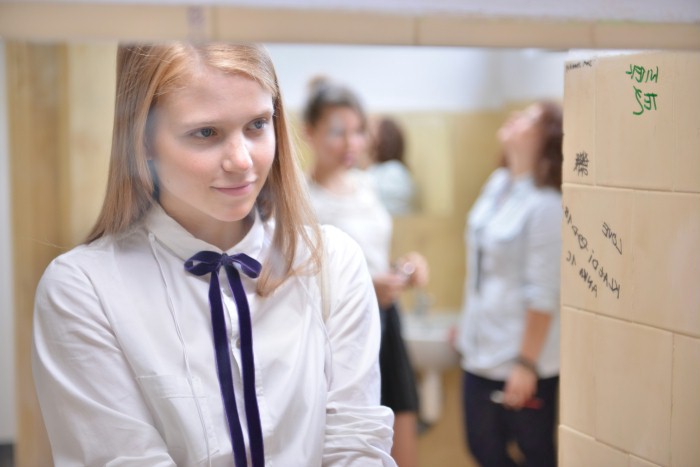The difficult transition to adulthood is a topic Polish writer-director Anna Kazejak has addressed repeatedly in her work. Kazejak made her feature debut in Ode to Joy, a triptych film co-directed by two other filmmakers that became an influential portrait of coming of age in post-Communist Poland. Her first solo outing, Flying Pigs, deals with the arrested development of a twentysomething whose world is turned upside-down when his local soccer club is disbanded. Her latest film, The Word, explores the heinous deeds teenagers are capable of, especially in a world where the grown-ups are as lost as their children.
The Word will play at this year’s Berlinale.
Please give us your description of your film.
Liliana is a 14-year-old junior-high student. Her boyfriend, Janek, is a year older than her. Misunderstood love impel them to commit a heinous crime. She is the mastermind. He is the blunt tool that she uses to execute her plan. I see these two characters as representative of a new generation that possesses all the benefits of the Western world. They are free of any historical or political burdens, but they use that freedom to create their own prisons. This concept is key to understanding the story in The Word.
What made you write this story?
The story was inspired by real-life events that took place in Poland and abroad. What happens in the story is not specific to the reality of Poland. But Poland has gone through a complete, visible change during the last two decades. In our current era of moral relativism, it is hard to have a single, universal moral code — something that would be very helpful to an adolescent. Attempts at a stress-free education and raising children in a world that lacks boundaries, role models, and inconsistent authority figures are giving rise to a generation of lonely, young people.
Still, I am not looking to point fingers or propose theories. I want to share a vision of a world rushing forward in which adults are lost children themselves. In the “absence” of their parents, actual children decide upon a code of crime and punishment completely independent of outside influence.
When going over various court transcripts, we got some insight into human emotions and their complexity. This insight allowed us to create non-cliched characters who are not easily categorized. Lila and Janek really love each other. However, they are not able to carry the burden of their own guilt, anger, and shared jealousy. They live in a world that gives them everything and does not demand anything in return. Perhaps that is the reason that they create a system of stringent rules, and the breaking of these rules demands a high price. Their uncompromising stance and conviction in their point of view is typical for their age group. I do not believe that people are born evil. I have to tell this story because there is nothing simpler than to denounce evil — and nothing more difficult attempting to understand it.
What was your biggest challenge in making the film?
There were a few challenges. One on the set: to combine professional actors with amateurs and create a realistic portrayal of young people that would be accepted by teenagers, but also uderstood by adults. It was also my first co-production [with Denmark], so I had to find common language with people I didn’t know before. In the end I found them very close to my state of mind.
What advice do you have for other female directors?
You have to be twice as wise and work twice as hard to reach the same position as men in the film business. But you can manage!
What’s the biggest misconception about you and your work?
There is a very strong expectation that female directors should stay in a female box. Every time I cross that line, there is some kind of consternation. It’s doesn’t become my problem as long as I have the possiblities to make a film.
Do you have any thoughts on what are the biggest challenges and/or opportunities for the future with the changing distribution mechanisms for films?
These days there are so many alternative channels of distribution, it is a really big challenge to keep the audience in the theater. Illegal Internet streaming makes the problem bigger and bigger. On the one hand, it is a simple robbery. On the other, it deprives the viewer the chance to see the film in the quality it is supposed to be presented in. I wish there was a clear and functional system to deal with movies on the Internet. That would give the authors and producers satisfaction and to get paid from that area of distributon.






